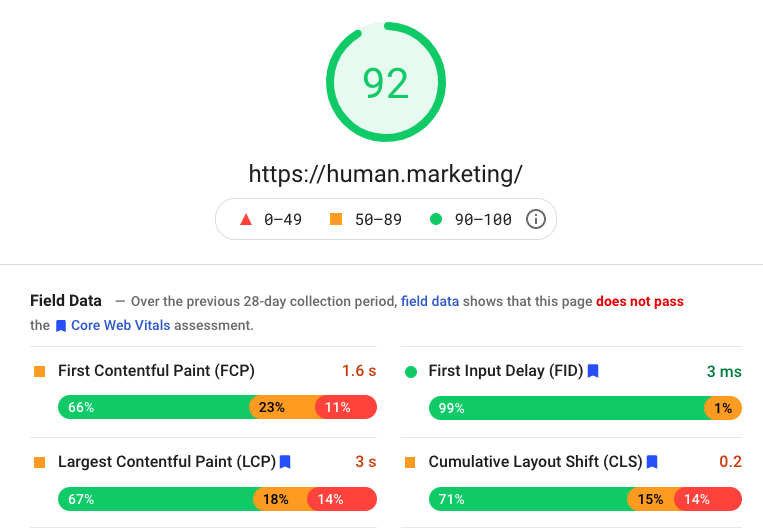Ever baffled by webpages that take ages to load yet still rank highly? Wonder why Google still surfaces pages in search results that make it impossible to click where you need?
All that's changing in May 2021 with Google Page Experience.
This algorithm update will reward webpages with more pleasing user experiences. In preparation, Google will also test adding visual indicators to search results that meet its page experience criteria.
And unlike Google’s typical surprise release fashion, it’s giving website owners an advanced notice to prepare for these changes.
What Is Google Page Experience?
Google’s mission is to give searchers relevant answers faster and with fewer disruptions.
The search engine began prioritizing website usability by adding page speed as a ranking factor in 2010 to encourage fast-loading pages.
And now, it’s introducing new experience metrics to evaluate pages for search.
Google describes the Page Experience updates as “a set of signals that measure how users perceive the experience of interacting with a web page beyond its pure information value.”
In short, Google is using key web usability metrics to compare pages when content is roughly equal.
These updates build upon Google’s existing user experience recommendations, like mobile-friendliness, safe browsing, HTTPs and no intrusive interstitials.
But with Page Experience also comes a new set of signals, known as Core Web Vitals.
Together, these improvements aim to:
- Create more delightful web experiences across web browsers and devices
- Increase user engagement
- Eliminate friction points
- Help sites meet user expectations on mobile
Understanding Core Web Vitals
Core Web Vitals is the new set of requirements that measures web experiences using the following criteria:
- Loading performance (Largest Contentful Paint): LCP refers to the largest image or text block visible in the viewport. Google recommends an LCP within the first 2.5 seconds of the page starting to load.
- Interactivity (First Input Delay): To evaluate interactivity, Google measures the time when someone engages your site (i.e., with a button click) until the site begins responding. This latency can be the result of the browser working on other tasks. Good page experiences have a score of less than 100 milliseconds.
- Visual stability (or Cumulative Layout Shift): CLS measures how much the elements in viewport move as the page loads. You should try to minimize the amount that elements jump around and aim for a CSL score of less than 0.1.
To understand how your website fares, Google has updated its developer tools to score pages against the Core Web Vitals recommendations:
- Google Search Console: Under enhancements, you’ll see a new “Core Web Vitals” page that alerts you to pages that don’t meet Google’s usability litmus test.
- PageSpeed Insights: Enter your website domain or a particular page to evaluate. Under Lab Data, you can see that page’s score for each Core Web Vital.

How Will User Experience Standards Impact Rankings?
While the true weight of these updates is unknown, Google’s historic approach to page experience suggests it’ll have a major effect on organic rankings.
Unlike previous updates, Google is giving website owners advanced notice of the change. The updates are set to roll out some time in 2021, and Google will notify the public 6 months in advance.
Google’s transparency about page experience standards and updates to developer tools also suggests the update will be monumental.
If you’ve overlooked user experience improvements in the past, now is the time to heed these warnings.
However, it’s important to note that a good page experience is not a substitute for underperforming content.
Google has made it clear that user experience metrics will help search algorithms rank pages with similar content, but it won’t lift pages with weak content. Strong content that answers the searcher’s intent will continue to be the gold standard for organic search.
How to Prepare for Google Page Experience
Page experience will be just one of the hundreds of ranking factors that Google uses to generate search results.
But if your website relies on organic traffic, you should take these warnings seriously.
Of course, it won’t make financial sense to rebuild your website to score perfectly, so it’s important to prioritize fixes for top-ranking pages and those that score below competitors.
At Human, we can help you audit your site and prioritize improvements to maximize your website’s ranking potential.
Chat with our team to start preparing your site for the Google Page Experience update!



